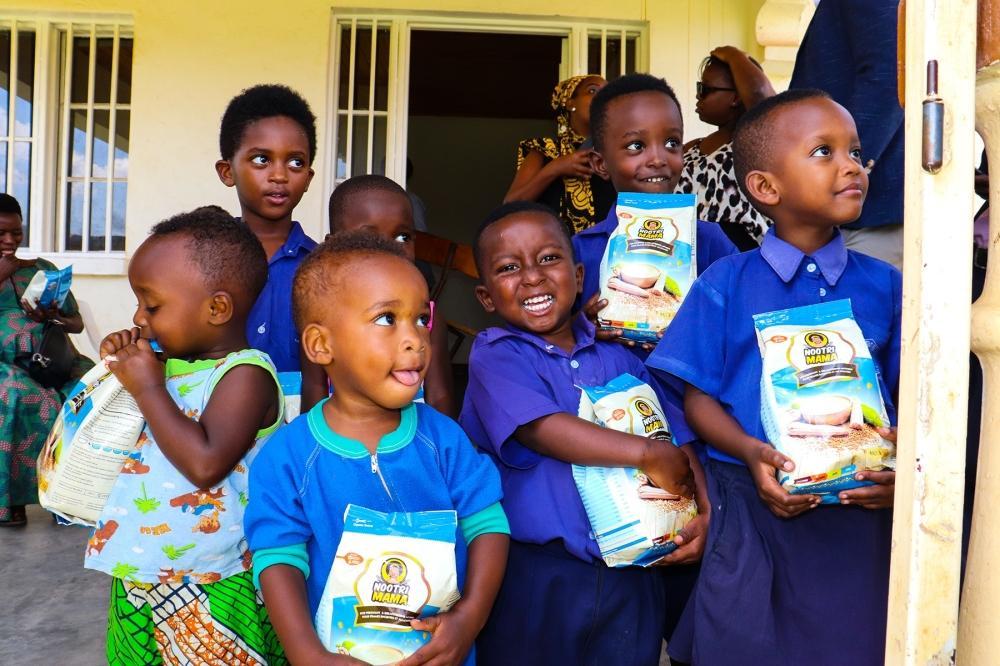Africa-Press – Rwanda. The government has invested a total of Rwf54.7bn in fortified blended food (FBF) initiative commonly known as Shisha Kibondo, according to Consolée Uwimana the Minister of Gender and Family Promotion.
While presenting to the Parliamentary Committee on State Budget and Patrimony on May 9, the Minister highlighted that this spending has brought about significant impact nationwide.
In the 2024/2025 fiscal year alone, the budget allocated to the initiative was Rwf15.5 billion and it was utilised at 100 per cent, the official said.
The government needs an additional Rwf15.1 billion will be needed in the 2025/2026 national budget to scale up the programme.
The Shisha Kibondo programme is implemented to provide nutritional support to children aged 6 to 24 months and pregnant and lactating women across the country.
Uwimana explained that the programme is part of the broader government strategy to reduce chronic malnutrition (stunting) from 33%, as recorded in the 2019–2020 Rwanda Demographic and Health Survey (RDHS), to 15% by 2029, in line with the targets set under the National Strategy for Transformation (NST2).
In addition to Shisha Kibondo, the Minister stated that the government has been implementing a Milk Support Programme, which provides milk to children suffering from malnutrition.
“In the 2024/2025 fiscal year, this initiative utilized Rwf702.5 million and also reached full implementation,” she said.
The minister also noted that the 2025/2026 budget outlines further interventions, including Rwf1 billion needed for the procurement and distribution of water purifiers and hand washing facilities to Early Childhood Development (ECD) centers and households with children under two, and the provision of fortified blended food to eligible children and mothers which will require Rwf15 billion.
“We are making a deliberate effort to tackle malnutrition from multiple fronts including nutrition, hygiene, and household awareness. These are complementary pillars in ensuring a child grows healthy,” she emphasized.
On the social protection front, the minister said that out of the Rwf195.9 million allocated to Tubarere mu Muryango initiative, loosely translated to “Let’s Raise Children in Families,” in 2024/2025, Rwf144 million has been spent, equivalent to 74 per cent execution.
Mireille Batamuliza, the Permanent Secretary at the Ministry of Gender and Family Promotion, indicated that there is a plan by the government to provide porridge flour per ECD center to 3,000 facilities nationwide, which will require a budget of Rwf1.2 billion.
A further Rwf1 billion is required for the procurement and distribution of animal-sourced foods such as fish powder through community cooking demonstrations and nutrition centers.
“To monitor health and nutrition, we have introduced a child scorecard model. It helps track interventions received by pregnant women and children under two, such as vitamin supplementation and regular weight checks,” she noted.
Batamuliza also stated that training has been prioritized: “We spent Rwf864 million on training caregivers and parents’ leaders to improve ECD service delivery and strengthen maternal, infant, and young child nutrition (MIYCN).”
The chairperson of the parliamentary committee, Odette Uwamariya, praised the efforts being made, particularly the Tubarere mu Muryango program and the construction of ECD centers, which she said are transforming nutrition and care services at the household level.
Assumpta Ingabire, Director General of the National Child Development Agency (NCDA), confirmed that other new ECDs are under construction in Kayonza, Gatsibo, and Nkombo Island.
She noted that the government also provides guidelines to private developers interested in building ECDs.
“We not only build ECDs ourselves but also support other actors by providing standard guidelines to ensure quality services before any project begins,” Ingabire said.
Shisha Kibondo, a maize-soya fortified blend enriched with vitamins and minerals, is one of the tools in Rwanda’s fight against child malnutrition.
Distributed free of charge to eligible families, it comes in two types, one tailored for infants and the other for pregnant and breastfeeding women.
For More News And Analysis About Rwanda Follow Africa-Press






